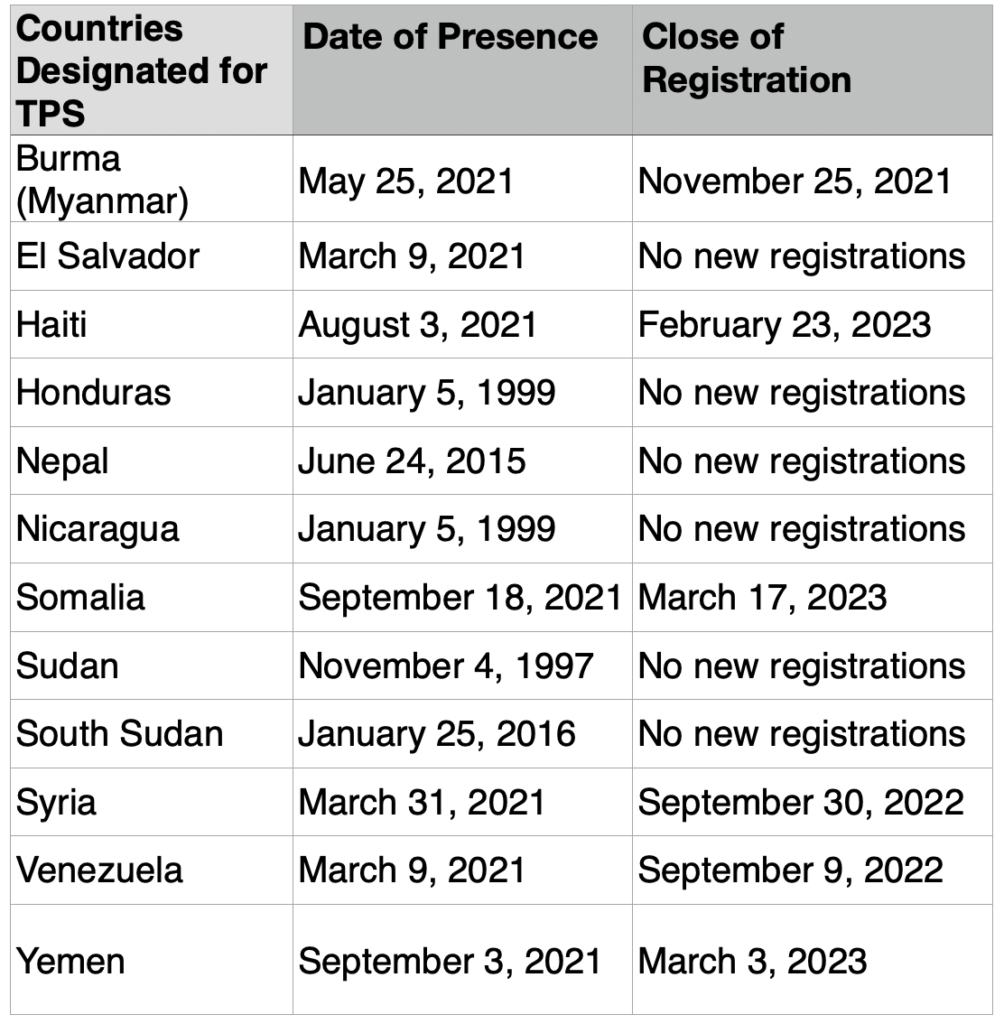 What is temporary protected status (TPS)?
What is temporary protected status (TPS)?
Temporary Protected Status is a temporary status given to eligible people from certain designated countries. The countries placed on this list are likely experiencing disaster, unrest, war, or other threats to the wellbeing of their citizens. TPS allows people from those countries to remain in the U.S until conditions in the home country improve. Any situation that would prevent foreign nationals from returning to their home country safely may be designated for TPS by the secretary of Homeland Security.
Which countries are on the TPS list?
The following countries are on the TPS list:

Do I qualify for TPS?
In order to be eligible for TPS, you must first be a citizen or national of a country designated for TPS. If you are a national of a country that has TPS designation, you must be able to prove that you’ve lived in the US continuously since a specific date listed next to your country’s name, and you must undergo a criminal background and security check. Your TPS application has to be filed within a registration window, and no additional applications are accepted once that registration period ends.
TPS does not bypass any regular bars to asylum. For example, a person who has been convicted of a felony or two misdemeanors committed in the United States will continue to be ineligible for asylum, regardless of their country’s protected status. This remains true for any other mandatory bars to asylum, such as a national security risk. When a new country is named for the TPS list, the government publishes a notice in the federal register, stating the time period for which the protection is granted.
 Can I qualify for a green card after I am granted TPS?
Can I qualify for a green card after I am granted TPS?
It is important to remember that an application for TPS does not lead to a green card. A grant of TPS is not admission to the United States. When the TPS expires, the grantee’s status will revert to whatever their immigration status was prior to the application for TPS.
If you entered the United States lawfully and went through inspection at a port of entry, then you might be able to apply for your green card. If you entered the United States and did not go through inspection, then when your TPS expires, you will have to leave the country and apply for lawful residence from your home country.
What documents do I need to apply for TPS?
An important part of any TPS application is the supporting documentation. You must submit proof showing that you actually are a national of the country that has been granted TPS. These documents can include a copy of a passport or birth certificate. You must also provide documents that prove that you have lived in the U.S. for the required amount of time. A copy of a passport, an I-94 form, employment records, or school records would be sufficient evidence of presence in the United States.
What are my rights once I’ve been granted TPS?
TPS allows you to receive a temporarily avoid deportation and to temporarily work in the US. TPS does not automatically include travel rights. Unauthorized travel outside of the United States will result in termination of TPS status. TPS beneficiaries, however, are eligible for advance parole which provides permission to travel abroad and return to the United States, but they must apply for it separately.
How can I apply for TPS?
If you believe that you qualify for TPS and would like to apply, contact Lundy Law Practice at (845) 522-8070 or at info@lundylawpractice.com. You can also book a consultation below. We look forward to helping you with your immigration matter!
DISCLAIMER: This blog is for informational purposes only and does not provide any legal advice. Information contained within this blog or on this website may not reflect or contain the most up-to-date legal information. Please do not rely on any information in this blog or on this website to guide your legal decisions; rather, contact Lundy Law Practice to speak with an attorney about your individual matter and to schedule a consultation. This blog post does not create an attorney-client relationship with Lundy Law Practice or any of its attorneys.
Published by Lundy Law Practice, LLC – 2022
